

.20210527084730.png)
- Modern, user-friendly interface
- Know where projects stand at a glance
- Open Zoom calls from any dashboard
- Free 14-day trial, no commitment
“monday.com offers some of the nicest customizable dashboards in the industry.“ (Jan 2025)


.20210527084933.png)
- Collaborate with real-time chat features
- Automatic import from other productivity apps
- Track progress and goals


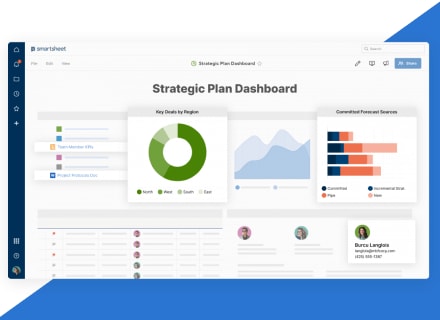
- Scalable project plans
- Advanced task tracking features
- Free 30-day trial


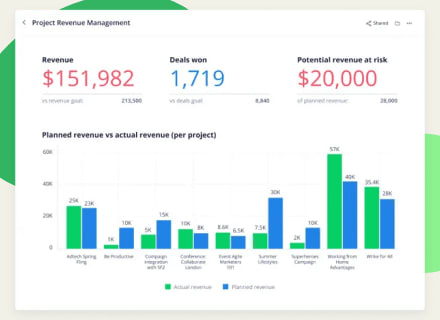
- Advanced project management features
- Automated workflows
- Free 14-day trial


.20210527085313.png)
- All-inclusive project management system
- Marketing automation features
- Freemium plan available, upgrade any time


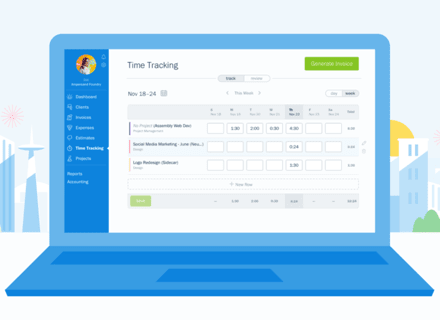
- Get 60% off for 6 months
- Easily track & interpret profitability
- Quick access to every important file
Why do I need project management software?
Project management software is a force multiplier. It helps you organize your time and resource management, create reports about business and employee performance, and get a better idea of what’s working and what isn’t. With project management tools, you can streamline workflows, reduce bottlenecks, and improve communication across teams. Additionally, many of the best project management software for small teams options today offer integrations with other work platforms, making them even more powerful for modern businesses. Project management templates also provide ready-to-use frameworks, helping managers and teams kick off projects faster.
Project management apps can make team collaboration easier and more seamless than ever before, especially for remote teams. For managers juggling multiple projects, the right project management tool can become an indispensable asset.
Is it easy to use?
Project management software is designed to be easy to use—after all, that’s the whole point of systems that are supposed to simplify your work. Top-rated project management programs offer intuitive dashboards and user-friendly interfaces that help employees adapt quickly. Many of the simple project management software also provide guided tutorials or walkthroughs to reduce the learning curve.
These project management apps are not only straightforward but also customizable, allowing companies to tailor their systems to meet specific needs. You can also find a scope of work template or ready-made project management template within these platforms to save time when creating new projects.
How steep is the learning curve?
The learning curve for team management software depends on the complexity of the platform and how many features you plan to use. For employees handling basic tasks, most project management tools are simple enough to master within a short time. Platforms offering the best project management apps or top project management tools prioritize user-friendly interfaces, enabling teams to quickly onboard and begin managing projects efficiently.
Even advanced features in the best project management software for small teams are designed to be approachable, often requiring no prior technical expertise. Templates, such as a scope of work template or pre-configured project management templates, can further reduce the complexity of project setups.
How much will it cost me?
The cost of project management software varies widely depending on the platform and features. Basic plans for many of the best project management tools start at around $5 per user per month, making them accessible to small businesses or startups. For larger organizations, investing in top project management tools with advanced features may cost more, with enterprise-level plans reaching $23.60 per user per month.
When choosing the best project management tool for your team, it’s essential to consider your budget and specific needs. If you’re running smaller projects, a free project management apps might suffice. However, businesses with extensive workflows may benefit from comprehensive project management programs that offer a greater range of features, such as advanced reporting, integrations, and access to customizable project management templates.
Is my data safe with Project Management software?
The security of your data is critical when using project management software. Most reputable project management tools are built with robust safeguards, such as encryption and firewalls, to protect user data. Additionally, the best project management apps allow businesses to control user permissions, ensuring that only authorized personnel can access sensitive information.
When evaluating options for the best project management software, look into how often the provider updates its security protocols and whether they offer a secure project management tool that aligns with industry standards. Features like password protection and access to a scope of work template can further help teams maintain confidentiality during projects.
Additional Benefits of Using Project Management Software
Modern project management software is more than just a scheduling tool. It’s a comprehensive platform for task management, collaboration, and resource allocation. With the best project management tools, teams can monitor progress in real time, identify bottlenecks, and optimize productivity. Pre-built project management templates eliminate the need to start from scratch, while customizable dashboards allow teams to track the metrics most relevant to them.
For freelancers or small teams, free or low-cost project management apps can offer essential features like task tracking and communication tools. Meanwhile, large organizations can leverage project management programs to manage portfolios, allocate resources, and maintain control over complex initiatives.
How to Choose the Best Project Management Software
Finding the best project management software for your needs involves evaluating features, scalability, and user experience. Look for top project management tools that align with your team’s workflows and provide flexibility to grow your business. For example, a scope of work template can be particularly useful for teams handling repetitive projects, while integrations with tools you already use can streamline operations.
The best project management app for you might also depend on whether you’re managing remote or in-office teams. Remote teams often benefit most from cloud-based project management tools, which provide real-time updates and allow seamless collaboration from anywhere.
This content was adapted using AI tools and includes human validation to ensure accuracy and quality.
Our Top 3 Picks
- 1

 exceptional9.8
exceptional9.8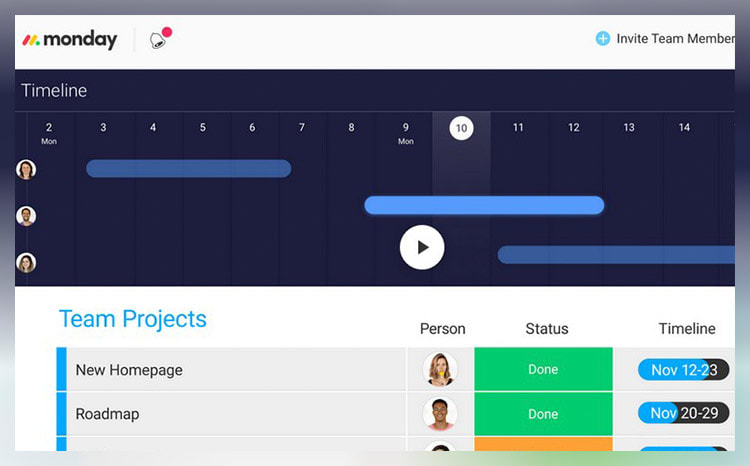 Efficient resource management tool
Efficient resource management tool- Price - From $27/month ($9/user/month)
- Team collaboration tools - Collaborative docs, updates, Zoom integration, whiteboards
- Free trial - 14 days
Efficient resource management toolRead monday.com Reviewmonday.com unifies your team’s tasks and processes into one user-friendly and visually pleasing interface.
As a work operating system, monday.com gives teams a clear view of responsibilities and deadlines, boosting transparency, accountability, and resource management. It features over 200 templates that can be customized with 20+ column options and various integrated apps. These tools simplify project setup and save time, helping you work more efficiently.
Additionally, you can tailor dashboards to provide detailed, team-specific views of tasks, project progression, and upcoming deadlines to enhance your team’s workflow clarity. Samyuktha Shivakumar, Global Marketing Operations Manager at Thoughtworks, reinforces this, stating that monday.com enables them “to budget the team’s time and efforts much more scientifically.”
Why we chose to review monday.com: monday.com tops our list for its combination of power, flexibility, and user-friendly design, making it ideal for even the most complex projects. It lets you seamlessly import data from spreadsheets and integrate it with your existing tools, eliminating manual data entry and freeing up time for other priorities.
Our experience: monday.com lets me implement processes that would’ve previously taken days or weeks within a few minutes. The platform’s communication tools, such as document sharing, comment annotation, and direct communication with task managers, improve collaboration within my team. The platform allows for excellent transparency for task management through easy-to-use sorting and color-coding methods.
monday.com Pros & Cons
PROS
Color-rich interface for improved organization and coordinationRobust list of supported, third-party integrationsDrag and drop project charting and timeline constructCONS
Pricing structure is fragmented and unclearCertain features (Gantt charts, timelines, etc.) are paywalled by higher-tier plans - 2

 excellent9.3
excellent9.3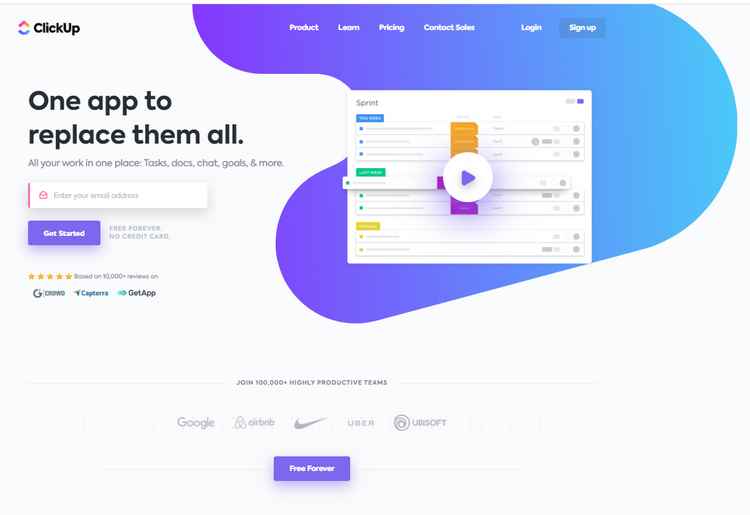 Visualize tasks and integrate apps
Visualize tasks and integrate apps- Price - From $7/month/user
- Team collaboration tools - Collaborative docs, real-time chat, file sharing, proofing
- Free trial - Free plan available
Visualize tasks and integrate appsRead ClickUp ReviewClickUp stands out with its diverse visualization tools, including Gantt charts, mind maps, and Kanban boards, which suit various project management styles.
These features make it easy to track tasks, monitor progress, and identify challenges.
The "Timeline View" offers a clear, linear way to plan schedules and create visual roadmaps. You can group tasks by assignee, priority, tags, custom fields, and more, allowing for a flexible and organized workflow. ClickUp also boosts team visibility with the "Pulse ClickApp," which shows who's online and their current tasks. Its global timer lets you track time automatically or manually, syncing seamlessly with your desktop, mobile, or browser.
Why we chose to review ClickUp: What sets ClickUp apart is its seamless integration with over 1,000 other apps, including Slack, GitLab, GitHub, and Webhooks. This capability makes it a go-to choice for development teams, allowing them to streamline their existing workflows.
Our experience: While trying out ClickUp, I was particularly impressed with ClickUp’s unique features, such as notepads, time tracking software, goal-setting tools, and pre-made templates. I also liked that I could use slash commands (typing “/” in any text field to trigger a command menu) to assign tasks, set due dates, or create subtasks quicker.
ClickUp Pros & Cons
PROS
AI CompatibleCan integrate with over 1,000 appsOffers numerous project tracking toolsCONS
Extensive feature list can be overwhelming for new usersSteep learning curve for beginners - 3

 excellent9.1
excellent9.1 Cloud-based dynamic work manager
Cloud-based dynamic work manager- Price - From $9/user/month
- Team collaboration tools - Real-time chat, forms, surveys, proofing
- Free trial - 30 days
Cloud-based dynamic work managerRead Smartsheet ReviewSmartsheet is a cloud-based work management platform that allows teams to manage dynamic work regardless of their location. With all data stored on the cloud and updated in real-time, you can track progress, identify potential issues early, and make data-driven decisions quickly.
This tool is also very user-friendly. A testament to Smartsheet’s ease of use comes from Janina Hill, Marketing Program Manager at WebEx, who notes, “Everybody has different levels of Smartsheet skills. But with drag and drop, all solutions are easy to use. Also, the workflow is much smoother when all processes are automated, and all information is in one place.”
This single-platform solution fosters interconnectivity across the entire organization, letting you share sheets with team members and effectively collaborate on projects. By centralizing data, it also reduces time spent on information management, boosting efficiency and enabling your team to focus on their primary responsibilities.
Why we chose Smartsheet: Smartsheet’s spreadsheet-like interface allows you to add new rows and columns as your project grows. This functionality can help you seamlessly expand small tasks into enterprise-wide initiatives. Additionally, its integration with apps like Slack, Teams, and Jira consolidates your data onto a single platform.
Our experience: Smartsheet allowed my team to strategically plan, implement, and monitor work on a large scale. This led to more streamlined processes, fostered innovation, and positively impacted overall business results within our own context. I found it invaluable in effectively navigating the complexities of today’s ever-changing work landscape.
Smartsheet Pros & Cons
PROS
Large template collectionEfficient content approval workflowsSurveying and form creation for both external and internal stakeholdersCONS
Latency for real-time updatesSome features have a steeper learning curve

